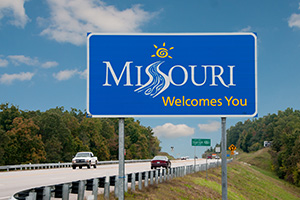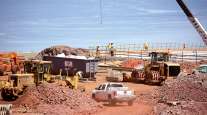MoDOT Dips Into Cash Reserve Amid Transportation Funding Challenges

JEFFERSON CITY, Mo. — When record and near-record flooding swept through Missouri in December, nearly 300 roads were underwater, including stretches of several interstates. State Department of Transportation crews spent days clearing debris from roadways and weeks rebuilding damaged stretches, racking up overtime and other costs.
Among the casualties was Missouri Highway 59 in McDonald County, where between 500 and 600 feet of the foundation for the road between Ginger Blue and Noel washed away.
Federal highway funding helped the state cover some of its disaster costs, but at the time, just before the start of the 2016 legislative session, many Missouri political leaders vowed they would make transportation funding a priority.
Flooding wasn’t the only challenge that MoDOT faced, either.
At one of the first hearings held after the Legislature convened in January, Patrick McKenna, director of the agency, said aging infrastructure remained a big concern.
There are nearly 10,400 bridges on the state highway system, and about 60% are older than their intended useful life of 50 years, he told lawmakers. Hundreds of them are in “critical condition.”
“While we have some money committed to their repair or replacement, the need is greater than the available resources,” McKenna told them, as he advocated for increased funding.
Missouri senators acted quickly on a bill that state Sen. Doug Libla (R-Poplar Bluff) called the “the best path forward,” given that voters in 2014 had rejected a three-quarters of a cent sales tax for transportation.
Libla proposed raising the tax on gasoline by 1.5 cents per gallon and the tax on diesel fuel by 3.5 cents per gallon Oct. 1 of this year. Missouri’s gas and diesel taxes have stood at 17 cents per gallon for 20 years, among the lowest in the country.
Libla, when he introduced his bill, said drivers who average 15,000 miles per year would have to pay $8 to $10 more than what they pay currently for gas annually.
Missouri Gov. Jay Nixon lauded the plan in his State of the State address Jan. 25. Trucking companies, construction trade unions and several chambers of commerce endorsed it.
The bill passed out of a Senate committee a few weeks later but was ultimately amended by Libla in March, raising both the gas and diesel tax by 5.9 cents per gallon. It would result in $165 million going toward MoDOT’s State Road Fund and about $35 million each going to counties and municipalities.
However, because of the size of the tax increase, it now would have to go to Missouri voters for ultimate approval.
Senate President Pro Tem, Ron Richard (R-Joplin) and state Sen. David Sater (R-Cassville) voted for the bill; state Sen. Ed Emery (R-Lamar) opposed it.
But in the House, Speaker Todd Richardson (R-Poplar Bluff) had made it clear at the beginning of the session that he was not in favor of an increase in the gas tax, and after the Senate passed its bill, he said he would survey House Republicans to determine their will. Earlier in the session, Richardson had said raising gas taxes would not be popular in an election year, but after the Senate version required that it go to voters, Richardson said that was more “palatable.”
Now, with just three weeks left in the session, the bill is awaiting action in the House. On April 22, the House Transportation Committee announced a hearing set for April 26.
Earlier this week, Minority Leader Jacob Hummel (D-St. Louis) questioned whether Republicans had the “political courage” to raise taxes. Hummel this past week attempted to add an amendment to a separate transportation bill that would add a 2-cent motor fuel tax increase, but he said debate was cut off to prevent him from doing so.
“All year, House Republicans have failed to offer a realistic plan to fix Missouri’s crumbling roads and bridges,” Hummel said. “For the majority party to block a discussion of this serious problem from even taking place is nothing short of cowardly. ... The only legislation even remotely relating to transportation funding the House has debated this year were bills to raise a whopping $11,000 for road improvements by expanding the availability of specialty license plates and a bizarre proposal to sell corporate naming rights for state roads and bridges.”
Later, in an interview with the Globe, Hummel said: “They were afraid if I offered the amendment, it would pass and then [Republican leaders] couldn’t say they didn’t raise taxes.”
State Rep. Bill Lant (R-Pineville) said the General Assembly often gets accused of not moving fast enough or working hard enough to create transportation funding solutions. Lant has been on the House Transportation Committee for six years.
He was there in 2014 when polls indicated an increased sales tax was more popular than an increase in the gas tax or toll roads, though the measure ultimately failed at the ballot. He said he also has seen other solutions proposed, but most end with the same result: shuffling around money when, he said, what MoDOT really needs is a new revenue source.
Lant said the importance of supporting increases in transportation funding is often lost on voters, in part because construction crews are often seen out in their communities working on projects, so the need and urgency isn’t felt until a disaster, such as the December floods. If the measure were to pass, Lant said a campaign to educate the public would need to be waged before the vote.
Lant’s district includes Highway 59 in McDonald County, where work continues but that remains closed, causing Tyson Foods to have to detour onto county routes with poultry trucks. MoDOT officials said the restoration should be finished in mid-July.
Lant also noted that many bridges in Missouri have limitations on them, including two Missouri Highway 96 bridges in Carthage. Both now have 10-ton weight limits because of deterioration of the spans, and large trucks — including fire trucks — have to find alternative routes.
MoDOT engineers have said the bridges are high priorities and that they are looking at ways to fund them. An estimate released this past fall was $3.6 million to replace both bridges, with the earliest work could begin being 2017.




